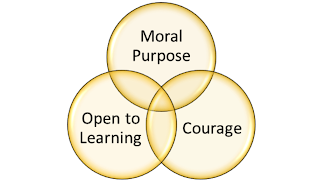 |
| Refresh, Reconnect, Refocus |
Apart from reading/listening to Brene Brown et al (who hasn't?) I haven't done much in the way of research or study about the topic of Wellbeing. My thoughts are based entirely on my 30 years of school leadership, with several of those years dealing with quite demanding situations ranging from angry people, to unmotivated people, to systemic confusion, to pandemics to climate crisis impacts.
What do I know?
Firstly, we must take personal responsibility for our own wellbeing. For me this has included 2 important elements: opportunity for personal reflection and 'me' time AND opportunity for connection with others.
I run. I often run for hours and for many miles, largely by myself. This gives me head space to reflect, process complex work and personal issues, solidify my thinking and make decisions. In these situations I often find myself exploring my 'why' in relation to any issue, thinking about what I'd 'die in the ditch' for, thinking about 'moral purpose'.
I connect and network with others. I do this through entering sporting events, socialising, attending and/or leading workshops, being part of various 'çritical friends' groups. Testing out my thinking, from my personal reflection time (running) within these networks brings a range of perspectives that will both support and challenge me.
This approach to wellbeing has contributed to the development of my personal leadership model shown below:
I have been doing a lot of thinking about how this impacts on wellbeing as principals throughout Aotearoa have access to $6000pa to support their wellbeing and I have seen many 'programmes' being offered to principals to spend this on.
Several I have seen offer time in a luxury resort, in some cases on a Pacific Island, with a combination of workshops on wellbeing and activities that are intended to contribute to wellbeing eg massage/spa, golf etc. There is no doubt that one's wellbeing, at that time, will be in a good space. The question has to be asked, though, is does such a programme have a longstanding beneficial impact on wellbeing, or will the luxury feeling soon be forgotten when once back in the trenches of leading a school?
My experience tells me that when I am certain of my 'why', when I can clearly enunciate it, when it drives my decision-making and my actions I feel better about myself and my contribution to the work of leading a school. This is the Moral Purpose from the model above.
I then find that I now have the confidence and the courage to act on my moral purpose and to bring it to life in my work. Displaying this courage makes me feel good.
But it is when I connect with others and share my moral purpose and plans for action with them as 'çritical friends' that some real gold lies. It is this connection that brings the richness to the work. For this to be effective I have to have an Open to Learning mindset and be prepared to discover that I might be wrong about some of my plans.
When these three come together I feel on top of the world in my work - my wellbeing is high. It becomes a way of working which brings a sustainability to my wellbeing development rather than me relying on the odd luxury escape or a few tools to manage my wellbeing.
Secondly, as leaders we need to be cognizant of our impacts on the wellbeing of others who are part of our work community but that we need to support them to find ways to develop their own wellbeing.
One of the most important things we can do to have a positive impact on the wellbeing of our people is to create an environment where our school's moral purpose is clear, where guidelines for action resulting from this purpose drive actions and decision-making, where we, everyday, walk the talk and support others to do so and where we show we welcome the voice of others as we might be wrong in some of our assumptions. People feel good, about themselves, their colleagues, their learners, their contribution and their work, when they are part of such an environment.
The
Refresh, Reconnect, Refocus programme Derek Wenmoth and myself have designed and which kicks off with a 2 day retreat at Hanmer Springs (nothing wrong with a bit of luxury!) on the evening of 20 March is driven by the principles described above. At the Retreat leaders will
refresh their thinking about what is possible and what their 'moral purpose' is,
reconnect with this purpose and with other like-minded leaders, and
refocus their work on bringing it to life in their schools.
Because it must be sustainable to have an impact the retreat is followed by a 20 week programme of online connecting with the whole group, with a critical friend and with Derek and myself as we support participants in their work. We will then conclude with a 24 hour celebration time together where we share our progress and discuss our next steps.
We have a mix of primary and secondary leaders signed up but there are
2 spaces left. If you think this is the programme for you to support your wellbeing and leadership growth or think it would be great for a colleague there is a brief window to sign up. Information and
registration processes are in this link.
Best wishes for 2024.




























